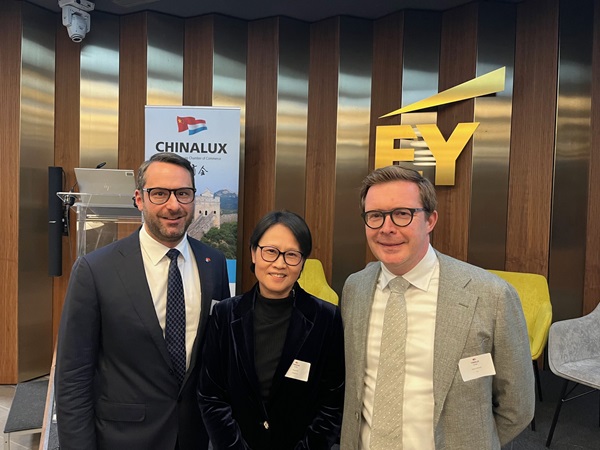 (L-R): Jacques Bortuzzo, ChinaLux; David Syenave, EY; Zhujun Xie, ChinaLux;
Credit: Chronicle.lu
(L-R): Jacques Bortuzzo, ChinaLux; David Syenave, EY; Zhujun Xie, ChinaLux;
Credit: Chronicle.lu
On Tuesday 12 November 2024, the China-Luxembourg Chamber of Commerce (ChinaLux) held a Luxembourg Real Estate Seminar at the premises of Ernst & Young in Luxembourg-Kirchberg.
Jacques Bortuzzo, Vice President of ChinaLux, China-Luxembourg Chamber of Commerce, opened the event and addressed the 80+ attendees.
Zhujun Xie, President of ChinaLux, welcomed everyone and looked back over the past few years during with the Lux real estate market has undergone many changes, and that we look forward to the recovery of the market, both commercial and residential. She said that Luxembourg attracts international investment and having a steady real estate market is very important.
David Syenave, Partner M&A Real Estate at EY Luxembourg, made a presentation on the Luxembourg (corporate) real estate market. He said that today's society is facing many challenges and is undergoing many changes, from banking interest rates to climate change. He mainly focussed on the Luxembourg commercial real estate market which has seen devaluations over the past three years, forecasting hat the market can only go up.
He recalled a few recent commercial real estate transactions in Luxembourg, including in the Cloche d'Or, the Avenue Monterey and on the Boulevard Royal, which all bode well for a recovery in the market. However, buyers and sellers are still often quite far apart in negotiations.
In Luxembourg City, the vacancy rate is only 2.84% which is very low, leading to a rise in commercial real estate. The city centre prime rent is currently around €54 per m2 per month - looking at the other districts in Luxembourg city, the rate in Kirchberg is €42, in the Gare district it is €40 and in the Cloche d'Or it is €38. While a large part of the available stock is in the city centre, the take up over the past few months has been by the Luxembourg state, with KPMG and StateStreet, Deutsche Bank and LuxDev having signed for future transactions.
Looking at key trends, he commented on the ECB's interest rate cuts in June and September 2024 which has created a more favourable environment, with a 10 basis point decrease in yields.
This presentation was followed by a panel discussion on valuation considerations, moderated by Laurent Cooreman, CEO, Belair House (a BIL subsidiary), who addressed the issue of lack of comparables when looking at valuations; as a result, their approach is to be very conservative.
Rodrigue Abi El Hesn, Head of Enterprise Risk Management at BIL, addressed surviving regulatory pressure. He addressed the BASEL IV requirements which will kick in, in January and it will have an impact on clients and on profitability. What it will do will shed light on valuation, requiring capital to loans they give to clients. Everyone will be subject to the same regulations. He talked about having to have independent conservative valuations. Banks will need to have the right valuation models to compute capital requirements.
Antoine Le Bars, Partner Banking and Capital Markets at EY Luxembourg, talked about the key elements of the valuation process from the perspective of an auditor. He talked about impacts on balance sheets. He address the concepts of Fair Value and Forward Looking, and key elements of quantification (e.g. m2) and subjectivity; regarding tenants, he addressed the issue of their solvency. He also talked about a risk-based approach, e.g. non-performing loans.
Max Didier, Managing Director at CDCL, active in construction and facilities management, talked about commercial real estate from a developer's perspective. He talked about internal valuations of projects, both commercial projects and residential real estate, including adding value to existing projects. He talked about the cost of land, construction costs where manpower costs are index-linked, professional costs from architects, etc., and also internal financing costs and risk and profit margins. He added that the trend of a growing population in Luxembourg (+10k in 2023, +13k in 2022) is expected to continue and therefore push up real estate prices, both in commercial and residential markets.
This was followed by a short Q&A moderated by Jacques Bortuzzo and a cocktail reception; the primary issue addressed here was the risk to real estate portfolios where leases with existing tenants ignore the rate of change of building certification regarding environmental and other issues.









